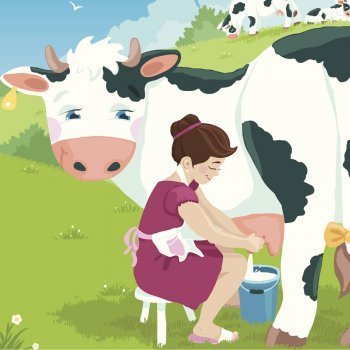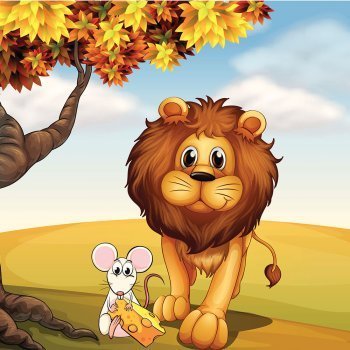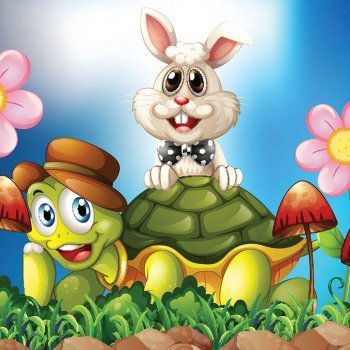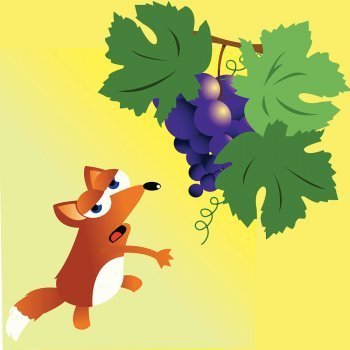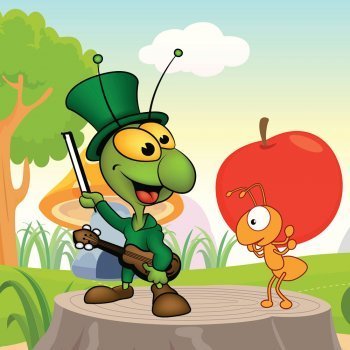Fábulas en inglés para niños con moralejas que hacen reflexionar
Cuentos con moraleja en inglés para aprender el idioma
- Lindas fábulas con moraleja en inglés para reflexionar con los niños
- Más fábulas en inglés para enseñar valores a los niños
- Otras fábulas en inglés que puedes leer con tus hijos
Las fábulas cortas son ideales para hacer reflexionar a los niños, ya que las moralejas de cada una dejan un lindo mensaje a los pequeños. Estas historias están en otro idioma, lo que ayudará que tu hijo mejore su comprensión de lectura y capacidad auditiva. Anímate a leerle cada una de estas fábulas en inglés para niños con moralejas que hacen reflexionar, ¡le fascinarán!
Lindas fábulas con moraleja en inglés para reflexionar con los niños
Estas tres fábulas son las más conocidas en el idioma de Shakespeare, aprenderán muchísimo vocabulario y, al leerlas en voz alta, podrán comentar sobre el mensaje que intentan transmitir. Todas dejan una enseñanza muy completa para todos los niños que están aprendiendo inglés.
Más fábulas en inglés para enseñar valores a los niños
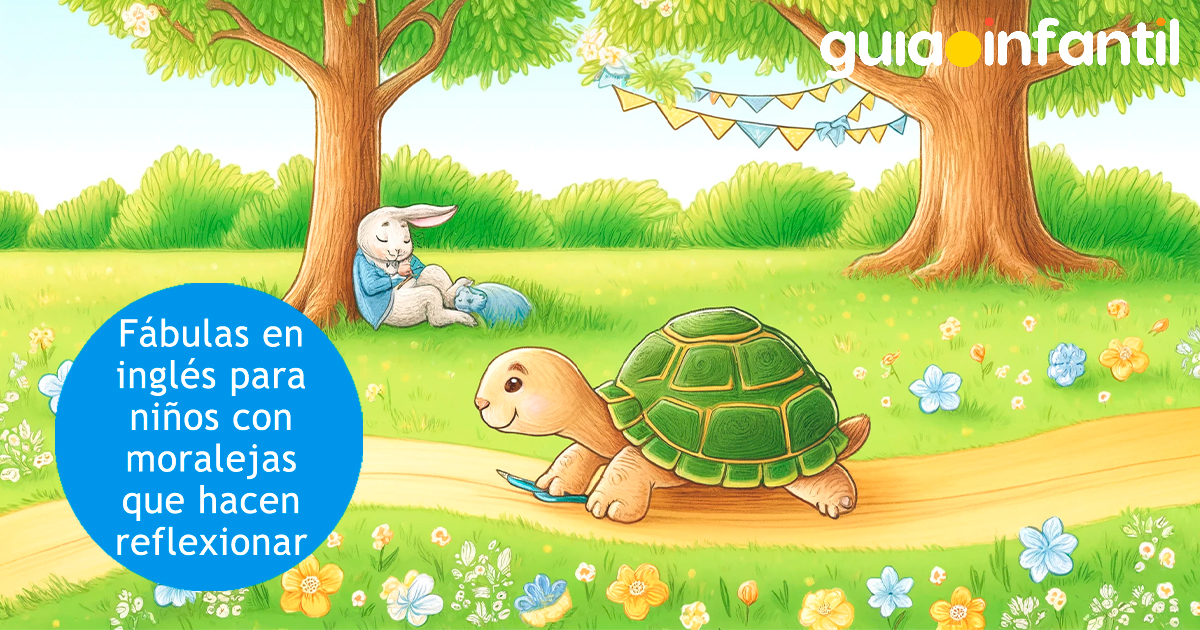
A continuación, te dejamos una breve selección de fábulas en inglés con moraleja, que ofrecen una gran enseñanza, la cual servirá a los niños para aprender sobre los distintos valores.
The hare and the turtle. Cuentos tradicionales en inglés para niños
In the world of the animals, there was a very arrogant hare because she said to everyone she was the fastest. That's why she was always laughing at the slow turtle.
- Look at the turtle! Hey turtle, don't run so much that you're going to get tired of going so fast!- The hare used to say laughing at the turtle.
One day, they were talking and it occurred to the turtle to make a strange bet with the hare.
- I'm sure I can win you a race- she said.
- To me?- asked the hare astonished.
- Yes, to you. Let's put our bet on that stone and let's see who wins the race.
The hare, very amused, accepted. All the animals met to watch the race. The road and the finishing line were marked. Once it was ready, the race started among big applauses.
Relying on her speed, the hare left the turtle go and she remained lazing about. She had time enough to win such a slow creature!
Then she start running, she run fast as the wind while the turtle went slow but without stopping. At once she went ahead. She stopped next to the road and she sat to rest.
When the turtle passed by her side, the hare made fun of her once more. She left her advantage and set out her quick walk. She did the same several times but, in spite of her mocks, the turtle kept her way until she arrived to the finishing line. When the hare woke up, she ran with all her might but it was too late, the turtle had won the race.
That day was very sad for the hare and she learnt a lesson she would never forget: you must never mock of the others.
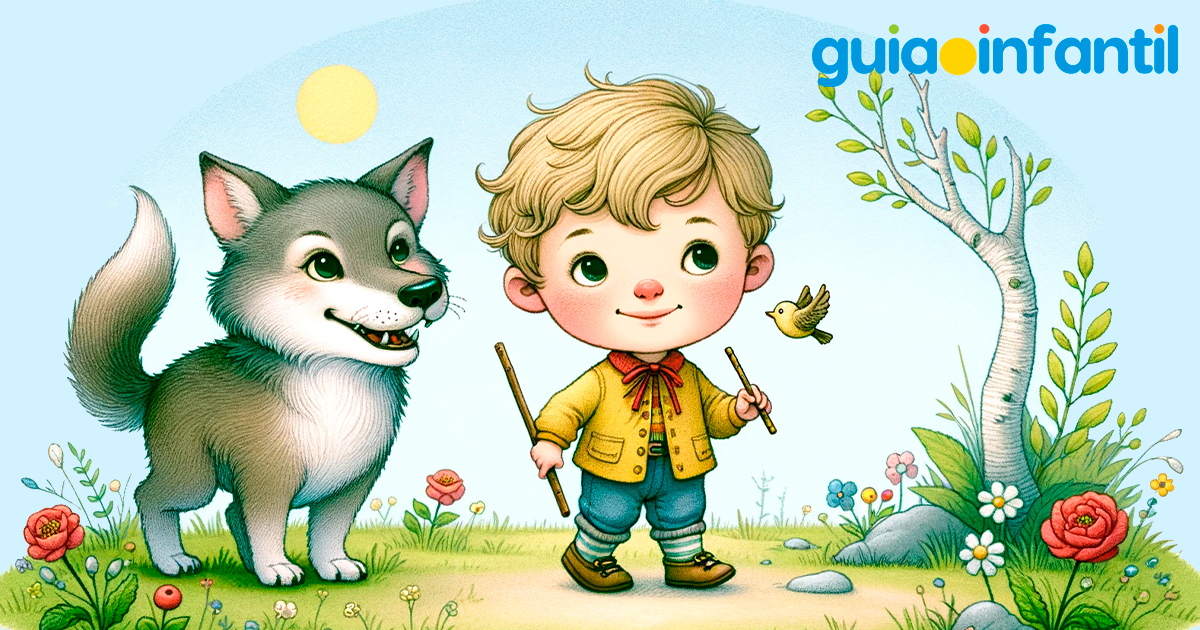
Peter and the wolf. Fábula corta para niños en inglés
Once upon a time, there was a little shepherd who took care of his sheep in the field of a small village. Every morning, very early, he always did the same. He used to go to the meadow with his flock and that was how he spent his time.
Since many times he used to get bored, one day, while he was resting under a tree, he had an idea. He decided that he would spend a good time amusing himself at the people from the village's expense. He started to cry:
- Help, the wolf! The wolf is coming!
The village's people took anything they had at hand and went to help the poor shepherd but when they arrived there, they discovered that everything had been a practical joke from Peter, who was cracking up laughing. The villagers got angry and decided to go back to their homes. When they had gone, the shepherd had found the joke so funny that he repeated it. And when he saw people far enough he started crying
- Help, the wolf! The wolf is coming!
The people from the village, hearing it again, started to run quickly thinking that this time the fierce wolf had appeared and that the shepherd really needed their help. But when they arrived where the shepherd was, they found him in the ground laughing at seeing how the villagers had come back to help him. This time the villagers got angrier and they left terribly angry with Peter's bad attitude and upset with the situation.
The next morning, while the shepherd was grazing with his sheep in the same place, he did not notice that a wolf was approaching. When he turned and saw it, the fear invaded his body. Seeing that the animal was getting nearer and nearer, he started crying desperately.
- Help, the wolf! The wolf is coming! He is going to eat all my sheep! Help!
But his cries were in vain. It was too late to convince the villagers that what he was saying was true. The villagers, having learnt the lies of the shepherd, turned a deaf ear this time. And what happened? The shepherd saw how the wolf leaped on his sheep while he tried to ask for help one more time.
- Help, the wolf! The wolf!
But the villagers kept ignoring him, while the shepherd saw how the wolf ate some sheep and took others for his dinner, without being able to do anything. And so, Peter recognized that he had been very unfair with the people of the village and, even though it was late, he regretted it and he never lied to people any more.

Fábula infantil en inglés. The fox and the grapes
It was a very hot and sunny afternoon. A fox, which had been hunting the whole day, was very thirsty. 'How I wish there was some water,' the fox thought to himself.
Just then, he saw bunches of fat and juicy grapes hanging from a vine above his head. The grapes looked ripe and ready to burst with juice.
'Oh, my! Oh, my!' the fox said as his mouth began to water. 'Sweet grape juice, quench my thirst!'
The fox stood on tiptoe and stretched as high as he could, but the grapes were out of his reach. Not about to give up, the fox walked back a short distance and took a running leap at the grapes. Again, he could not reach the grapes.
The fox jumped and leapt, again and again, but each time he could not reach the grapes. Until, at last, the fox was tired and thirstier than ever. 'What a fool I am!' said the fox furiously. 'These grapes are sour and not fit for eating. Why would I want them anyway?'
Otras fábulas en inglés que puedes leer con tus hijos

Finalizamos con estas tres fábulas que pondrán a pensar a los niños:
- The boy and the candies. Se trata de un cuento corto de Esopo con el que podrán repasar más vocabulario y lectura en la lengua inglesa. Lee The boy and the candies, una fábula en inglés que trata sobre un niño que aprende una valiosa lección: por quererlo todo, podría quedarse sin nada, por lo que tu hijo reflexionará sobre la codicia y sus consecuencias.
- The Ant and the Grasshopper. Con la fábula infantil en inglés The Ant and the Grasshopper incentivarás la lectura en los niños y que mejor que sea en inglés, porque así tus hijos podrán aprender este idioma de una manera didáctica. Con este cuento breve aprenderán una importante moraleja: si sabes valorar el trabajo, a largo plazo tendrá sus beneficios.
- The lion and the mouse. Esta bonita fábula en inglés para niños de Esopo llamada The lion and the Mouse enseña el valor de la amabilidad y el aprecio por los demás. Además, gracias a sus protagonistas los niños aprenderán que todos, independientemente de su tamaño, somos necesarios y somos capaces de colaborar con los demás, por lo que jamás se deben despreciar la capacidad ni las promesas de los demás.
Puedes leer más artículos similares a Fábulas en inglés para niños con moralejas que hacen reflexionar, en la categoría de Fábulas en Guiainfantil.com.
Publicado:
Actualizado:
Bibliografía
- Hernández Lombardo, E. (2017). Árbol de la sabiduría. Beneficios de la lectura en los niños. Centro de Desarrollo Infantil y Atención Temprana I (CDIAT I) (ed.), Fundación Salud Infantil Elche, España, pp. 1-2 Disponible en: https://fundacionsaludinfantil.org/wp-content/uploads/2017/12/HernandezLombardo2017.pdf

